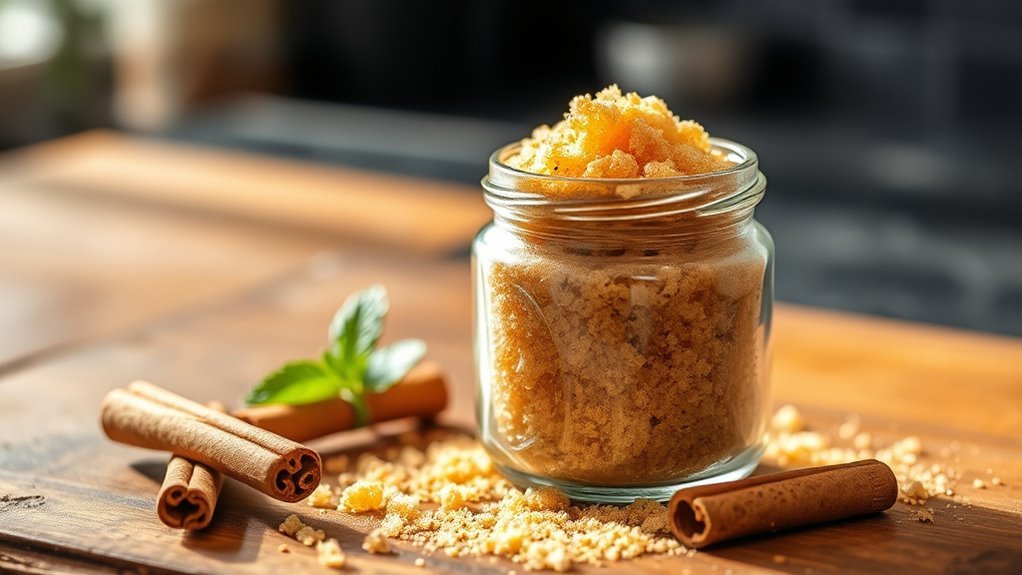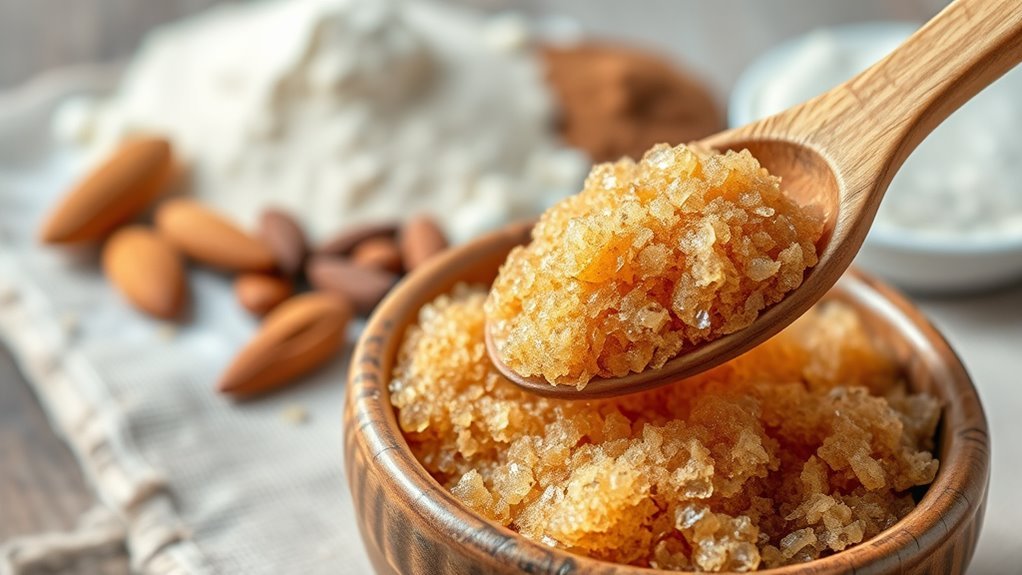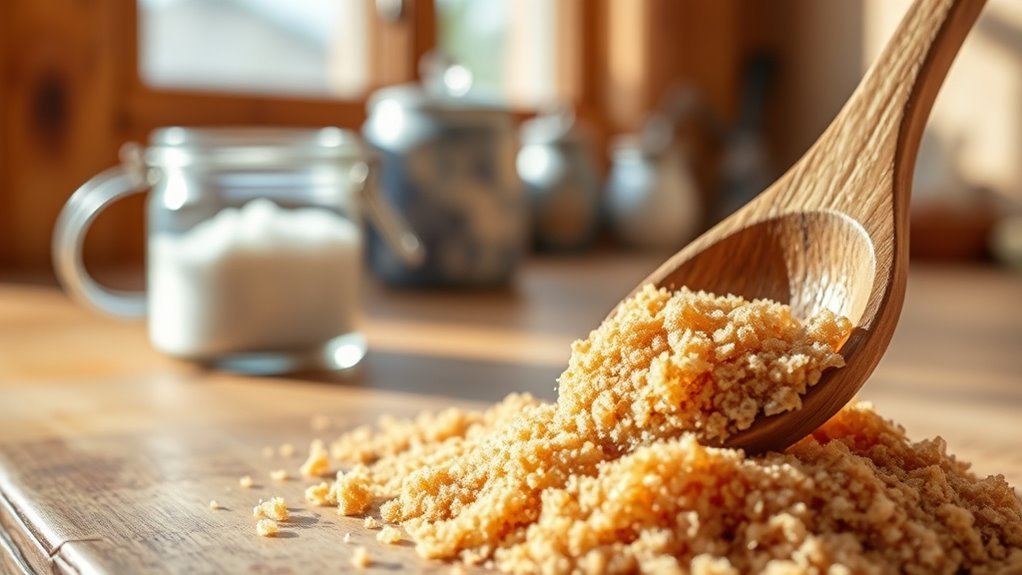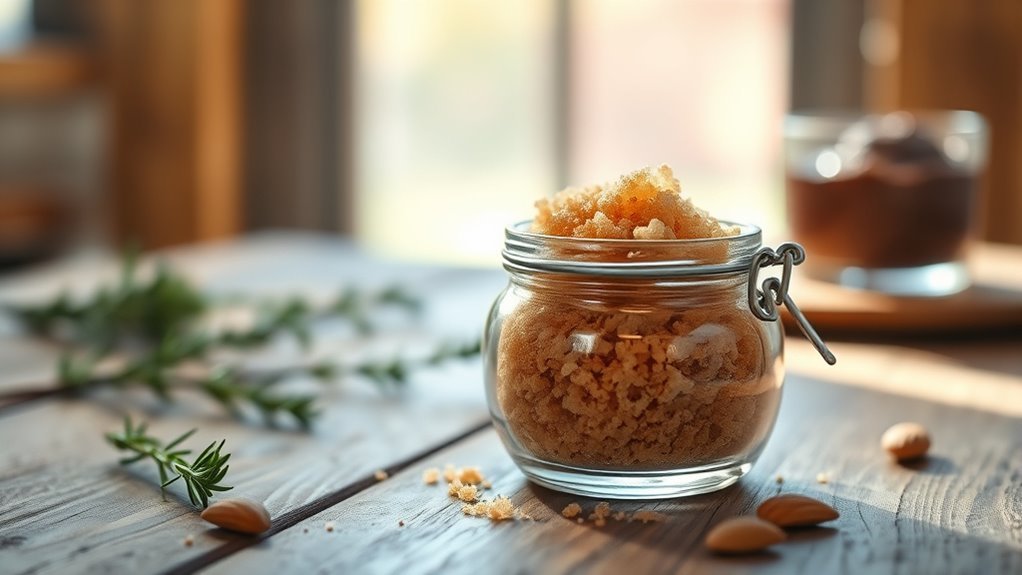Brown sugar isn’t keto-friendly due to its high carbohydrate content, which can disrupt ketosis. It contains about 4 grams of carbs per teaspoon, triggering an insulin response that hinders fat burning. While it adds a rich flavor to baked goods, it’s important to seek out low-carb alternatives like erythritol or stevia instead. These substitutes can help satisfy your sweet cravings without affecting your ketosis. Discover more about making smarter sweetener choices for your keto diet.
Understanding Carbohydrates in Brown Sugar

When considering whether brown sugar fits into a ketogenic diet, it is important to understand its carbohydrate content. Brown sugar mainly consists of sucrose, a carbohydrate type that your body metabolizes quickly, leading to spikes in blood sugar. In a keto diet, where you aim to minimize carbohydrate intake, the 4 grams of carbs per teaspoon of brown sugar can quickly add up, potentially disrupting your ketosis. Additionally, sugar metabolism involves insulin response, which can hinder fat-burning. While you might crave sweeteners, it’s vital to explore alternatives that align better with your dietary goals. Balancing your desire for sweetness with the need to maintain low carb levels is key in achieving the freedom that a ketogenic lifestyle offers.
Brown Sugar vs. White Sugar: What’s the Difference?

When comparing brown sugar and white sugar, you’ll notice differences in nutritional content, flavor, and texture. Brown sugar contains molasses, which gives it a unique taste and moisture that can affect baking results. Understanding these distinctions can help you make informed choices in your culinary applications.
Nutritional Content Comparison
Although both brown sugar and white sugar are commonly used sweeteners, their nutritional content reveals some key differences that may affect your dietary choices. While neither is particularly healthy, brown sugar does offer some nutritional benefits over white sugar. Here’s a quick comparison:
- Mineral Content: Brown sugar contains trace minerals like calcium, potassium, and iron due to its molasses content.
- Caloric Difference: Brown sugar has slightly fewer calories per teaspoon compared to white sugar.
- Glycemic Index: Brown sugar may have a marginally lower glycemic index, but the difference isn’t significant.
- Flavor Profile: The presence of molasses in brown sugar can enhance its flavor, though this isn’t a nutritional benefit.
Ultimately, understanding these differences can help you make informed choices in your diet.
Flavor and Texture Differences
The differences in flavor and texture between brown sugar and white sugar can greatly impact your culinary outcomes. Brown sugar has a richer, more complex flavor profile due to its molasses content, giving it caramel-like notes that can enhance baked goods. In contrast, white sugar offers a cleaner, more straightforward sweetness. When considering texture comparison, brown sugar is often moister and clumpier, which can add chewiness to cookies or cakes. White sugar, being drier and granulated, provides a lighter, airier texture in certain recipes. Understanding these distinctions can help you choose the right sugar for your needs, allowing you to create dishes that align with your flavor preferences and desired textures.
Culinary Uses and Applications
While both brown sugar and white sugar serve as sweeteners in various recipes, their unique properties lead to different culinary applications. Brown sugar’s moisture content and molasses flavor make it preferable for specific dishes. Here are some key uses:
- Baking: Brown sugar adds moisture and richness, making it ideal for cookies and cakes.
- Sauces: Its caramel notes enhance marinades and barbecue sauces, giving depth to flavors.
- Baking Substitutes: If you’re out of white sugar, use brown sugar in equal amounts for a more complex taste.
- Oatmeal and Yogurt: Stirring brown sugar into these breakfast favorites provides a delightful sweetness and texture.
Understanding these culinary applications helps you make informed choices in your cooking endeavors.
The Impact of Sugar on Ketosis

When you’re following a ketogenic diet, understanding sugar’s role in ketosis is essential. Consuming sugar can disrupt your body’s ability to enter or maintain ketosis, as it raises insulin levels and encourages glucose use for energy. Fortunately, there are several alternatives to brown sugar that can satisfy your sweet tooth without derailing your keto goals. Incorporating suitable alternatives helps you maintain carb limits while enjoying sweetness without affecting your progress.
Sugar’s Role in Ketosis
Understanding sugar’s role in ketosis is essential for anyone following a ketogenic diet, as even small amounts can greatly impact your body’s ability to enter and maintain a state of ketosis. When you consume sugar, it triggers your sugar metabolism, which can halt the ketosis process. Here are four key points to evaluate:
- Blood Sugar Levels: Sugar spikes your blood glucose, prompting insulin release.
- Ketone Production: Elevated insulin levels inhibit ketone production, essential for ketosis.
- Energy Source: Your body prefers glucose over fat, hindering fat utilization.
- Adaptation Period: It can take time to adapt to using fat as fuel; sugar can disrupt this.
Additionally, understanding hidden carbs in foods can further support maintaining ketosis while avoiding unnecessary sugar intake.
Alternatives to Brown Sugar
For those following a ketogenic diet, finding suitable alternatives to brown sugar is important to maintain ketosis. You’ll want to explore various sugar substitutes that provide sweetness without spiking your blood sugar. Popular options include erythritol, stevia, and monk fruit, which are low in carbohydrates and don’t affect insulin levels. Natural sweeteners like allulose can also be a great choice, mimicking the taste of sugar without the carbs. These alternatives not only help you stay in ketosis but also allow you to enjoy your favorite recipes without compromise. Always check labels to verify they meet your dietary needs, and experiment to find the sweetener that suits your palate best. Your journey to freedom in flavor can continue without brown sugar! Additionally, understanding the high sugar content of traditional sweeteners is crucial to making informed dietary choices.
Nutritional Profile of Brown Sugar
Brown sugar, often seen as a more natural alternative to white sugar, carries a unique nutritional profile that merits examination. While it’s still sugar, understanding its nutritional value can help you make informed choices. Here are some key points:
- Calories: Brown sugar contains about 15 calories per teaspoon, similar to white sugar.
- Minerals: It contains small amounts of minerals like calcium, potassium, and iron, giving it a slight edge.
- Glycemic Index: Brown sugar has a similar glycemic index to white sugar, affecting blood sugar levels comparably.
- Moisture Content: The molasses in brown sugar contributes to its moisture content, impacting texture in recipes.
While it has some benefits, moderation is essential for maintaining a balanced diet.
How Brown Sugar Affects Blood Sugar Levels
Although many people perceive brown sugar as a healthier option, it can still considerably impact blood sugar levels. Its glycemic index (GI) is relatively high, similar to that of white sugar, meaning it can cause a significant blood sugar response. When you consume brown sugar, your body breaks it down quickly, leading to a spike in glucose levels. This can be particularly concerning if you’re managing conditions like diabetes or following a ketogenic diet. While it may contain trace minerals compared to refined sugar, the difference isn’t substantial enough to mitigate its effects on blood sugar. Ultimately, if you’re conscious about your sugar intake, it’s wise to limit brown sugar just as you would with other sweeteners.
Keto-Friendly Sweetener Alternatives
When you’re following a ketogenic diet, finding suitable sweetener alternatives can be essential for maintaining ketosis. There are several keto-friendly sweeteners you can consider, each with unique benefits. Here’s a quick keto sweeteners comparison:
- Stevia: A natural sweetener with zero calories, it won’t spike your blood sugar.
- Erythritol: A sugar alcohol that’s low in calories and has minimal impact on blood glucose levels.
- Monk Fruit: A natural fruit-derived sweetener that’s calorie-free and has antioxidant properties.
- Allulose: A low-calorie sugar substitute that tastes like sugar but has negligible effects on insulin.
Incorporating low-sugar options can help you enjoy sweet flavors while sticking to your keto lifestyle. These sugar substitutes benefits can keep your sweet tooth satisfied without compromising your keto lifestyle. Explore them to find what works best for you!
Tips for Reducing Sugar Intake on Keto
Reducing sugar intake on a ketogenic diet is key for staying in ketosis and achieving your health goals. Start by incorporating sugar substitutes like stevia, erythritol, or monk fruit, which can satisfy your sweet tooth without impacting your carb count. Practice mindful eating—this means slowing down and savoring your food, which helps you appreciate flavors without relying on sugar. Be cautious of hidden sugars in sauces and processed foods; read labels carefully. Gradually reduce your sugar intake to avoid cravings; your taste buds will adapt over time. Instead of reaching for sugary snacks, opt for healthy fats or high-fiber foods, which can keep you full. Embrace this journey to freedom from sugar, enhancing both your health and well-being. Additionally, understanding the impact of carb intake is crucial for maintaining ketosis and achieving keto goals.
Making Informed Choices for Your Keto Diet
Making informed choices on your keto diet is essential for long-term success and health. To thrive on this lifestyle, consider these key strategies:
- Keto Meal Planning: Prepare meals in advance to avoid impulse eating and guarantee you stay within your carb limits.
- Carb Counting: Keep track of your daily carb intake to maintain ketosis. Aim for 20-50 grams of net carbs.
- Read Labels: Always check nutritional labels for hidden sugars and carbs in packaged foods.
- Healthy Substitutes: Use keto-friendly alternatives for high-carb ingredients, like almond flour instead of regular flour.
Frequently Asked Questions
Can I Use Brown Sugar in Keto Baking Recipes?
If you’re aiming for a keto-friendly bake, brown sugar’s not your best friend. Think of it like trying to fit a square peg in a round hole. Instead, consider using keto substitutes like erythritol or monk fruit sweetener. These baking alternatives mimic the sweetness without the carbs, allowing you to enjoy delicious treats without straying from your goals. So, go ahead and experiment with these options for a guilt-free baking experience!
Are There Any Health Benefits to Brown Sugar?
There are some health benefits to brown sugar, though they’re limited. Its nutritional profile includes small amounts of minerals like calcium, potassium, and iron, thanks to the molasses content. This gives it a slight edge over white sugar, but it’s still high in calories. Its natural sweetness can enhance flavor in moderation, making it a better option for some than artificial sweeteners. Just remember, balance is key for overall health and well-being.
What Is the Glycemic Index of Brown Sugar?
The glycemic index of brown sugar hovers around 64, dancing just above the line of moderation. This means it can spur a noticeable glycemic response, sending your blood sugar levels on a rollercoaster ride. If you’re seeking freedom from those spikes, consider sugar alternatives like stevia or erythritol, which typically have a minimal impact on blood sugar. Balancing enjoyment and health is key, so choose wisely and savor each sweet moment.
How Much Brown Sugar Can I Consume on Keto?
On a keto diet, it’s best to limit or avoid brown sugar altogether due to its high carb content. Instead, consider using keto alternatives like erythritol or monk fruit as sugar substitutes. These options can satisfy your sweet tooth without spiking your blood sugar levels. While you might crave brown sugar, sticking to low-carb sweeteners helps you maintain ketosis and enjoy the freedom of your dietary choices without compromising your goals.
Is Organic Brown Sugar Different From Regular Brown Sugar?
Yes, organic brown sugar is different from regular brown sugar. It’s unrefined and retains more molasses, offering potential organic sugar benefits like trace minerals. While it’s still sugar, you might consider brown sugar alternatives if you’re seeking lower glycemic options. Sweeteners like stevia or monk fruit can provide sweetness without the added carbs. Always weigh your choices to fit your lifestyle, ensuring you enjoy your meals while staying aligned with your health goals.
1. Is brown sugar considered keto-friendly?
No, brown sugar is not considered keto-friendly. On a ketogenic diet, the goal is to minimize carbohydrate intake, and brown sugar contains a significant amount of carbohydrates, similar to white sugar. A single tablespoon of brown sugar contains about 13.5 grams of carbs, which can quickly exceed daily carb limits for those on a keto diet.
2. What are the carbohydrate contents of brown sugar?
Brown sugar contains approximately 13.5 grams of carbohydrates per tablespoon. This high carbohydrate content makes it unsuitable for a ketogenic diet, which typically restricts daily carbohydrate intake to around 20-50 grams to maintain ketosis.
3. Are there any keto-friendly alternatives to brown sugar?
Yes, there are several keto-friendly alternatives to brown sugar. Popular options include erythritol, monk fruit sweetener, and stevia. These sweeteners have low or zero carbohydrates and can be used in recipes to provide a sweet flavor without impacting ketosis.
4. Can I use brown sugar in moderation on a keto diet?
While some people may choose to use brown sugar in very small amounts, it is generally not recommended on a keto diet due to its high carbohydrate content. Even small amounts can add up quickly and impact your ability to stay in ketosis. It’s best to opt for keto-friendly sweeteners instead.
5. What happens if I consume brown sugar while on a keto diet?
Consuming brown sugar while on a keto diet can disrupt ketosis, as it raises blood sugar levels due to its high carbohydrate content. This can lead to increased insulin levels and may cause cravings for more carbohydrates, making it harder to stick to a ketogenic lifestyle. It’s crucial to monitor carb intake carefully to avoid such pitfalls.
References
- https://www.healthline.com/nutrition/brown-sugar-vs-white-sugar
- https://www.webmd.com/diet/obesity/what-is-keto-diet
- https://www.ncbi.nlm.nih.gov/pmc/articles/PMC6520706/
- https://www.mayoclinic.org/healthy-lifestyle/nutrition-and-healthy-eating/in-depth/keto-diet/art-20460416
- https://www.verywellfit.com/what-is-the-keto-diet-5115823


